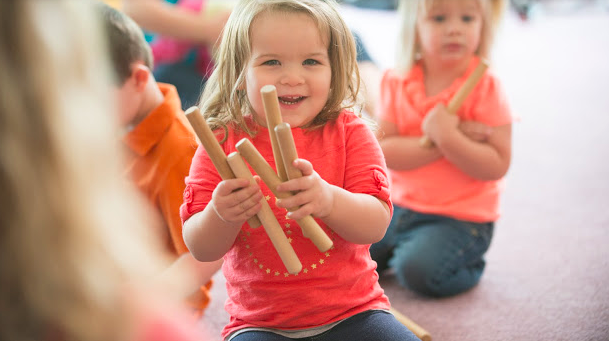 How do you know if your child is ready for kindergarten? Parent Elizabeth Devitt says, “I change my mind every day.” To enter kindergarten, the school systems of Richmond and its surrounding counties require that children be five years old by September 30. While Devitt’s son, whose birthday is in August, will meet this requirement, he will be young for his class, and this leaves her with reservations. “It concerns me that with so many parents holding kids back now, if my son attends kindergarten this year, he’ll be in a class with children essentially two years older than he is.”
How do you know if your child is ready for kindergarten? Parent Elizabeth Devitt says, “I change my mind every day.” To enter kindergarten, the school systems of Richmond and its surrounding counties require that children be five years old by September 30. While Devitt’s son, whose birthday is in August, will meet this requirement, he will be young for his class, and this leaves her with reservations. “It concerns me that with so many parents holding kids back now, if my son attends kindergarten this year, he’ll be in a class with children essentially two years older than he is.”
She says kindergarten isn’t the issue for her son. It’s how he’ll cope a few years down the road that’s a little unsettling.“I’ve never heard anyone say they regretted their decision to hold their child back a year, but I’ve heard plenty of parents say they wish they’d waited,” explains Devitt.
With kindergarten registration next month, many parents are wondering how to prepare their children. For your child to be ready for kindergarten, he needs to be prepared physically, socially, and academically. How should parents go about this? It’s simpler than you might think, and begins with some basic fundamentals. Physical health is a primary and often neglected factor that affects your child’s ability to learn. Good health includes everything from getting an adequate amount of restful sleep to proper physical development. A quick check with the American Academy of Pediatrics’ website reveals that children ages five to twelve need between ten and eleven hours of sleep per night.Pediatrician and father Scott Iwashyna,M. D., of West End Pediatrics agrees.He also points out that poor sleep can mimic many of the symptoms of ADHD, like inattention, hyperactivity and poor impulse control – factors that clearly make learning more difficult. Aside from sleep, there are additional physical factors that affect your child’s ability to learn.For example, recurring ear infections may delay speech development. A child who cannot hear speech is likely to have difficulty learning to speak correctly.Hindered speech may result in poor vocabulary development and pronunciation, two things essential for written and oral communication.
Dr. Iwashyna also stresses the importance of handgrip, as this is important for writing. Looking for simple activities for improving hand strength? Playing with play dough, making model airplanes, copying patterns, completing mazes, building with blocks, practicing with scissors, and using lacing cards are all great choices. When your child is coloring, model the proper grip when holding the crayon and help him do the same. The proper grip is placing the crayon between thumb and pointer finger, with middle, ring, and pinky fingers touching the palm.All of these activities strengthen the hand muscles needed for writing.
Kindergarten readiness also depends on social factors, which pediatricians evaluate through the preschool years.According to Uptodate.com, an online medical resource for clinicians and patients, the children who will be most successful in the early going, are those who know how to interact with others, rather than those who may already know the ABCs and 123s. Social skills are best improved by engaging your child in social activities with other children their age. These activities can include play dates, visits to the park and library, or enrollment in preschool or an art or gym class. The important thing is to expose your children to situations where they can observe and practice proper interaction so they are better prepared come kindergarten time.
Learning how to properly interact socially is something that has to be practiced and modeled. Terry Tusing, director of Canterbury Preschool in Henrico County, suggests several ways parents can do this. First, it’s up to parents to set limits for use of personal electronics and other handheld games. Also, turn off DVDs and videos during short car trips, and engage your child in conversation instead. Play games so that your child understands how to take turns and wait in line. Teach your child to clean up. This teaches him to become independent and to take pride in the job he’s completed.
According to Tusing, helping your child understand what’s expected of him and that school is a fun and safe place will give him the confidence to succeed. Most importantly, says Tusing, “Remember that once the proper social skills are in place, the cognitive skills will come later.”
Veteran kindergarten teachers in Henrico, Chesterfield, and Richmond public schools agree, and say the first steps in determining kindergarten readiness are socially based. Kathy Streetman, who teaches at Rivers Edge Elementary in Henrico County, says, “Routine related readiness skills I look for include the ability to sit quietly, stand and walk in a line, share, take turns, and follow directions.” Boiled down, these are social skills that can all be taught through play, following Tusing’s earlier suggestions.
Lisa Sturtevant, who teaches at Robious Elementary in Chesterfield County, explains why it’s so important to make reading to your child an interactive activity. She says, “By the end of the year, students are expected to read and write a simple story.” You can prepare your child by engaging him in the story, asking him to predict, re-tell, and even act it out. As Lisa Callis, who teaches at Mary Munford Elementary in Richmond points out, “While kindergarten is now more academic than it once was, play is still a vital part. Kids are kids – not adults.”
That said, parents and caregivers should consider play a platform for the development of the social skills so essential to academic success.




